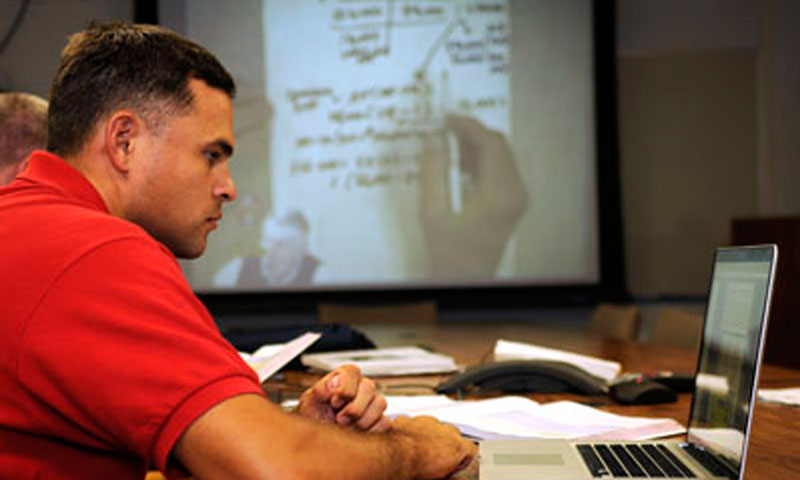The defense budget has taken center stage in recent months, bringing efficient spending and responsible management to the forefront of concerns for the new fiscal year. With the proposed $150 billion in budget cuts and savings over the next five years, it is imperative that the Department of Defense prepare civilian and military leaders to make responsible choices in the future.
But long before this became a primary focus for Defense leaders, the Naval Postgraduate School (NPS) began offering a defense-based Master of Business Administration program in 2003 to prepare young officers for just that need. This niche MBA, as with all NPS programs, also aligns with the CNO’s commitment to ensuring that all Naval officers are offered the chance at a quality graduate education.
"In the fiscal environment we face today, efficient resource management is absolutely critical,” explained Rear Adm. Dixon Smith, Commander, Navy Region Hawaii and Commander, Naval surface Group Middle Pacific. “Educating our officers and civilian managers about efficient resource management ensures they possess the knowledge and skills required to be innovative and efficient, enabling them to make quality resource management decisions and complete the mission."
For many, however, the opportunity to take two years away from their duty stations to study on campus in Monterey, Calif. presents a unique challenge. For those individuals, the Executive Master of Business Administration (EMBA) program has been tailored to fit their demanding duty schedules.
The program offers a defense-based, distributed learning (DL) graduate education to eligible officers from Hawaii to Washington D.C. and everywhere in between.
“In our current financial crisis, having a business degree is a central driver for being able to identify waste and inefficiencies within the many DoD domains,” explained Cmdr. Adonis Mason, one of the EMBA students stationed on the Island of Oahu in Hawaii, and the Deputy N5 for the Plans, Programs and Requirements Department at the Naval Computer and Telecommunications Area Master Station (NCTAMS) Pacific. “EMBA is designed to provide us with the skills to tackle the uncertain resource challenges explicitly associated with the Department of Navy. It arms you with the necessary decision-making tools to help identify cost savings, as well as to maximize reduced resources through optimization and streamlining measures.”
“Achieving an EMBA is critical to upward career movement, this program is designed to be completed while you are working another job,” explained Lt. Erik Molina, Executive Assistant to the Commander, Navy Region Hawaii/Commander, Naval Surface Group Middle Pacific. He, Mason, and one DoD civilian make up the Hawaii EMBA cohort, meeting once a week with NPS professors via video teleconferencing (VTC) to go over lessons and questions.
“Due to the entire class being comprised of Naval officers and DoD civilians, classroom discussions are very relevant to day-to-day life in the Military,” said Molina. “Consequently, application of the concepts, such as group dynamics, moral responsibility and finance, comes very naturally. Having access to the perspectives of both junior and senior officers and civilians on tough issues is very advantageous and influences my day to day conduct.”

Lt. Erik Molina reviews his notes on his computer for his Executive Master of Business Administration (EMBA) course.
Since these students are working during the day, the workload can be intimidating. The program is designed to be flexible enough for students to complete their studies around their work schedules, with a comprehensive curriculum that gets students as close a possible to the in-residence MBA experience.
But the fast-paced program requires diligence and proper planning from students, noted Mason.
“It’s challenging to maintain a balance, but I knew when I applied for the program that it wasn’t going to be an easy ride,” said Mason.
A father of five, the program allows him to work on his studies in the evening when his children are asleep. But, how ever they manage to make time for schoolwork, they all have the same end goal in mind – applying their educations to their daily duties, and helping the DoD to operate as efficiently as possible.
“I serve as the CO’s primary technical expert for strategic planning, monitoring, coordinating, analyzing and reporting on all strategic Command, Control, Communications and Computers (C4) regional issues and efforts underway in the Pacific Naval Communications Area which impact NCTAMS PAC or its regional sites,” explained Mason.
“I have already started applying some of the concepts from my coursework to a number of my job functions,” he added. “As I continue with the program, I will persistently be on the lookout for practical strategies that I can implement to improve the management of our information technology (IT) investments as well as the efficiency and performance of our command IT systems, operational procedures and our business processes.”

